Crimea and US fear losing global dominance

Noam Chomsky Correspondent
THE current Ukraine crisis is serious and threatening, so much so that some commentators even compare it to the Cuban missile crisis of 1962.
Columnist Thanassis Cambanis summarises the core issue succinctly in The Boston Globe: “[President Vladimir V.] Putin’s annexation of the Crimea is a break in the order that America and its allies have come to rely on since the end of the Cold War — namely, one in which major powers only intervene militarily when they have an international consensus on their side, or failing that, when they’re not crossing a rival power’s red lines.”
This era’s most extreme international crime, the United States-United Kingdom invasion of Iraq, was therefore not a break in world order — because, after failing to gain international support, the aggressors didn’t cross Russian or Chinese red lines.
In contrast, Putin’s takeover of the Crimea and his ambitions in Ukraine cross American red lines.
Therefore “Obama is focused on isolating Putin’s Russia by cutting off its economic and political ties to the outside world, limiting its expansionist ambitions in its own neighbourhood and effectively making it a pariah state,” Peter Baker reports in The New York Times.
American red lines, in short, are firmly placed at Russia’s borders. Therefore Russian ambitions “in its own neighbourhood” violate world order and create crises.
The point generalises. Other countries are sometimes allowed to have red lines — at their borders (where the United States’ red lines are also located). But not Iraq, for example. Or Iran, which the US continually threatens with attack (“no options are off the table”).
Such threats violate not only the United Nations Charter but also the General Assembly resolution condemning Russia that the United States just signed. The resolution opened by stressing the UN Charter ban on “the threat or use of force” in international affairs.
The Cuban missile crisis also sharply revealed the great powers’ red lines. The world came perilously close to nuclear war when President John Kennedy rejected Premier Khrushchev’s offer to end the crisis by simultaneous public withdrawal of Soviet missiles from Cuba and American missiles from Turkey. (The US missiles were already scheduled to be replaced by far more lethal Polaris submarines, part of the massive system threatening Russia’s destruction.)
Russia’s annexation of Crimea was an illegal act, in violation of international law and specific treaties. It’s not easy to find anything comparable in recent years —the Iraq invasion is a vastly greater crime.
But one comparable example comes to mind: US control of Guantanamo Bay in south-eastern Cuba. Guantanamo was wrested from Cuba at gunpoint in 1903 and not relinquished despite Cuba’s demands ever since it attained independence in 1959.
To be sure, Russia has a far stronger case. Even apart from strong internal support for the annexation, Crimea is historically Russian; it has Russia’s only warm-water port, the home of Russia’s fleet; and has enormous strategic significance. The United States has no claim at all to Guantanamo, other than its monopoly of force.
One reason why the United States refuses to return Guantanamo to Cuba, presumably, is that this is a major harbour and American control of the region severely hampers Cuban development. That has been a major US policy goal for 50 years, including large-scale terror and economic warfare.
The United States claims that it is shocked by Cuban human rights violations, overlooking the fact that the worst such violations are in Guantanamo; that valid charges against Cuba do not begin to compare with regular practices among Washington’s Latin American clients; and that Cuba has been under severe, unremitting US attack since its independence.
But none of this crosses anyone’s red lines or causes a crisis. It falls into the category of the US invasions of Indochina and Iraq, the regular overthrow of parliamentary regimes and installation of vicious dictatorships, and our hideous record of other exercises of “upholding peace and stability.”
© 2014 Noam Chomsky distributed by The New York Times Syndicate







Comments